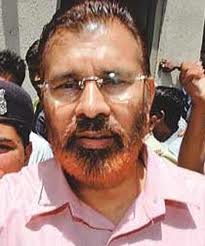
Mr. Vanzara, a 1987 batch IPS officer considered close to Mr. Modi, has said in his resignation letter that police officers involved in alleged fake encounters “simply implemented the conscious policy” of the government whose place “should either be in Taloja central prison at Navi Mumbai or in Sabarmati Central Prison at Ahmedabad.”
Mr. Vanzara, lodged in Sabarmati central jail, in a 10-page hard-hitting resignation letter to Additional Chief Secretary of the state’s Home department, has accused the state government, particularly former Minister of State for Home Amit Shah of betraying him and 32 other officers, in jail in encounter killing cases being probed by the CBI.
He said he used to adore Mr. Modi like God, who could not rise to the occasion under the “evil” influence of Shah, a co-accused in Sohrabuddin Sheikh and Tulsiram Prajapati encounter cases.
Holding Narendra Modi government responsible for his and other police officers’ actions, Mr. Vanzara said they had only “complied” with the policy of the Gujarat government. “I would like to categorically state in the most unequivocal words that the officers and men of Crime Branch, ATS and Border Range, during the period between 2002 and 2007, simply acted and performed their duty in compliance of the conscious pro-active policy of zero tolerance towards terrorism of this government after Godhra riots,” he said.
“Gujarat CID and Central agency CBI had arrested me and my officers in different encounter cases holding us to be responsible for carrying out alleged fake encounters. If that is true then the CBI investigating officers have to arrest the policy formulators also as we, being field officers, have simply implemented the conscious policy of this government which was inspiring, guiding and monitoring our actions from the very close quarters,” Mr. Vanzara said.
“By this reasoning I am of the firm opinion that the place of this government instead of being in Gandhinagar, should either be in Taloja central prison at Navi Mumbai or in Sabarmati Central Prison at Ahmedabad,” he said, in his letter dated September 1.
Here are 10 quotes from Vanzara's letter bomb:
- I have been maintaining my graceful silence only because of my highest respect for Narendra Modi, whom I used to adore like a god.
- I am sorry to say my god did not rise to the occasion under the evil influence of Amit Shah, who usurped his eyes and ears and has been successfully misguiding him by converting goats into dogs and dogs into goats for the last 12 years.
- The criminal negligence of this government and willful acts of omission and commission by Amit Shah towards the fate of 32 jailed officers are so nauseating that it may take this government to the cremation ground sooner or later.
- Amit Shah introduced the dirty policy of use the officers and throw them by deliberately spreading disinformation about them.
- I categorically state that officers and men of the Crime Branch, ATS and Border Range, during the period 2002-2007, simply acted and performed their duties in compliance with a conscious policy of this government.
- But for the sacrifices made by me and my officers in thwarting the onslaught of initial disorder in the state, the 'Gujarat model of development' which this government is so assiduously showcasing at the national level would not have been possible.
- It would not be out of context to remind (Modi) that he, in the hurry of marching towards Delhi, may kindly not forget to repay the debt which he owes to jailed police officers who endowed him with the halo of Brave Chief Minister.
- This government, through the dirty tactics of Amit Shah, is only managing for its own self to swim and prosper in all directions while allowing police officers to sink and die a natural death.
- The Gujarat CID/CBI had arrested me and my officers in different encounter cases holding us to be responsible for carrying out alleged fake encounters. ...CBI investigating officers have to arrest the policy formulators also as we, being field officers, have simply implemented the conscious policy of this government which was inspiring, guiding and monitoring our actions from very close quarters.
- The government has been reaping very rich political dividends since last 12 years keeping the glow of encounter cases alive in Gujarat.





Comments
Add new comment